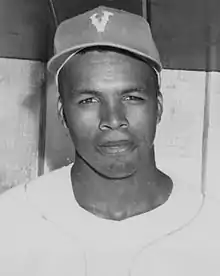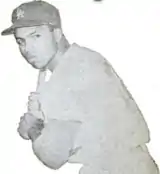Tommy Davis
Herman Thomas Davis Jr. (born March 21, 1939) is an American former professional baseball player and coach. He played in Major League Baseball as a left fielder and third baseman from 1959 to 1976 for ten different teams, most notably for the Los Angeles Dodgers where he was a two-time National League batting champion.
| Tommy Davis | |||
|---|---|---|---|
 | |||
| Left fielder / Designated hitter | |||
| Born: March 21, 1939 Brooklyn, New York | |||
| |||
| MLB debut | |||
| September 22, 1959, for the Los Angeles Dodgers | |||
| Last MLB appearance | |||
| October 2, 1976, for the Kansas City Royals | |||
| MLB statistics | |||
| Batting average | .294 | ||
| Home runs | 153 | ||
| Runs batted in | 1,052 | ||
| Teams | |||
| Career highlights and awards | |||
| |||
During an 18-year baseball career, Davis batted .294 with 153 home runs, 2,121 hits and 1,052 runs batted in. He was also one of the most proficient pinch-hitters in baseball history with a .320 batting average (63-for-197) – the highest in major league history upon his retirement, breaking the .312 mark held by Frenchy Bordagaray. In 1962, he finished third in the MVP voting after leading the major leagues in batting average, hits and runs batted in. Davis' 153 RBIs in that season broke Roy Campanella's team record of 142 in 1953 and remain the franchise record; his 230 hits are the team record for a right-handed batter (second most in franchise history behind only Babe Herman's 241 in 1930), and his .346 average was the highest by a Dodger right-handed hitter in the 20th century until it was broken by Mike Piazza in 1997.
Baseball career
Early career
Davis was born in Brooklyn, New York. He attended Boys High School in Brooklyn, where he was a basketball teammate of future Basketball Hall of Famer Lenny Wilkens, as well as a long jumper on the school's track and field team with record breaker Bernard Lowther. In 1956, he was considering signing with the New York Yankees, but a phone call from Jackie Robinson convinced him to sign with the Brooklyn Dodgers instead.[1] In his minor league career, he won batting titles in the Midwest League and Pacific Coast League.
The Dodger years

By the time Davis made the majors, the Dodgers had moved to Los Angeles; he debuted with a pinch-hitting appearance on September 22, 1959. He batted .276 in his 1960 rookie season, and .278 in 1961, before enjoying his breakout year in 1962 as the team moved into the new Dodger Stadium. His .346 batting average edged out Frank Robinson's .342 for the National League batting crown, and his 230 hits and 153 RBIs led the major leagues. His 230 hits in 1962 were the most in a season by any player between 1937 and 1969, while his 153 RBIs, a franchise record, was the highest total reached between 1949 and 1998. He also had career bests with 27 home runs, 120 runs and 9 triples as the Dodgers finished the regular schedule tied for first place with the San Francisco Giants, but lost a three-game playoff. He finished third in the MVP balloting, with teammate Maury Wills winning the award and Willie Mays finishing second.
In 1963, Davis won his second batting title, edging Roberto Clemente by 6 points, and finished eighth in the MVP balloting. In the 1963 World Series, the Dodgers swept the New York Yankees; batting cleanup, Davis hit .400 in the Series, tripling twice in Game 2 and driving in the only run of the 1-0 Game 3 victory, his first-inning single off Jim Bouton driving in Jim Gilliam.
To date, Davis' back-to-back batting titles are the only two in the Dodgers' Los Angeles history. Only two right-handed hitters have won multiple National League batting titles since: Bill Madlock with four, and Roberto Clemente with four. Davis won the batting titles while playing his home games at Dodger Stadium—one of Major League Baseball's less hitter-friendly parks.
Davis slumped to .275 in 1964 as the Dodgers finished out of contention for the pennant. On May 1, 1965, against the visiting Giants, he broke and dislocated his ankle sliding into second base while trying to break up a double play and was lost for the remainder of the season, although he did pinch-hit on the final day of the regular season. Three days later the Dodgers called up Lou Johnson to replace him. They won the World Series that year, defeating the Minnesota Twins in seven games. Davis rebounded in 1966, batting .313 (but with only three home runs and 27 RBIs in 313 at bats). Los Angeles was swept by the Baltimore Orioles in the World Series, with Davis starting only two of the four games and batting .250.
10 teams in 10 years
After the 1966 World Series, Davis was traded to the New York Mets, along with Derrell Griffith, for Ron Hunt and Jim Hickman. After batting .302 with 16 home runs and 73 RBIs in 1967 he was traded again, this time to the Chicago White Sox in a six-player deal, with the Mets acquiring Tommie Agee and Al Weis—two men who would play major roles in the Miracle Mets winning the 1969 World Series. In 1968, in what would become the "Year of the Pitcher", Davis led the White Sox in hitting with a .268 average.
In October 1968 Davis was selected by the Seattle Pilots in the expansion draft. During the 1969 season he batted .271 in 123 games with the Pilots before being traded to the Houston Astros, where he hit .241; his 20 stolen bases that year were a career high. He began 1970 with Houston, hitting .282, before his contract was sold to the Oakland Athletics in June; he hit .290 with the A's before being sent to the Chicago Cubs for the last two weeks of the season. The Cubs released him in December, and he re-signed with the A's as a free agent, rebounding with a .324 campaign in 1971. But Oakland released him at the end of 1972 spring training; he signed with the Cubs again in July, but played only a month before being traded to the Baltimore Orioles, where he would spend the next three seasons. In Baltimore, he served as the designated hitter from 1973–75, finishing third in the 1973 batting race with a .306 mark and placing tenth in the MVP vote; in 1974 he was second in the American League with 181 hits. In 1974 he won the Outstanding Designated Hitter Award (later renamed for Edgar Martínez). He played in two American League Championship Series (both times, in 1973 and 1974, the Orioles lost to the eventual World Series champion Athletics). The Orioles released him in 1976 spring training, and he signed with the Yankees but did not play for them. From June to September he hit .265 with the California Angels before ending the season with the Kansas City Royals. He retired after being released by the Royals on January 17, 1977, having played for ten different teams in eighteen seasons. He occasionally expressed resentment for his numerous moves, remarking late in his career: "I'm very bitter, bitter as hell. Why do I keep getting released? Don't ask me no reason why." But he conceded his reputation as having a casual style of play, noting, "the lazier I felt the better I hit", and admitting that he often went into the clubhouse to read and even to shave between at bats as a DH with Baltimore. After his retirement from baseball as a player, he served as a Seattle Mariners coach in 1981.
See also
References
- Dylan Hernandez (2008-02-01). "Dodgers remember Jackie Robinson". Los Angeles Times. Archived from the original on 2008-02-12. Retrieved 2008-02-01.
Further reading
- Baseball: The Biographical Encyclopedia (2000). Kingston, New York: Total/Sports Illustrated. ISBN 1-892129-34-5.
External links
- Career statistics and player information from Baseball-Reference, or Baseball-Reference (Minors), or Retrosheet
- Official Tommy Davis website